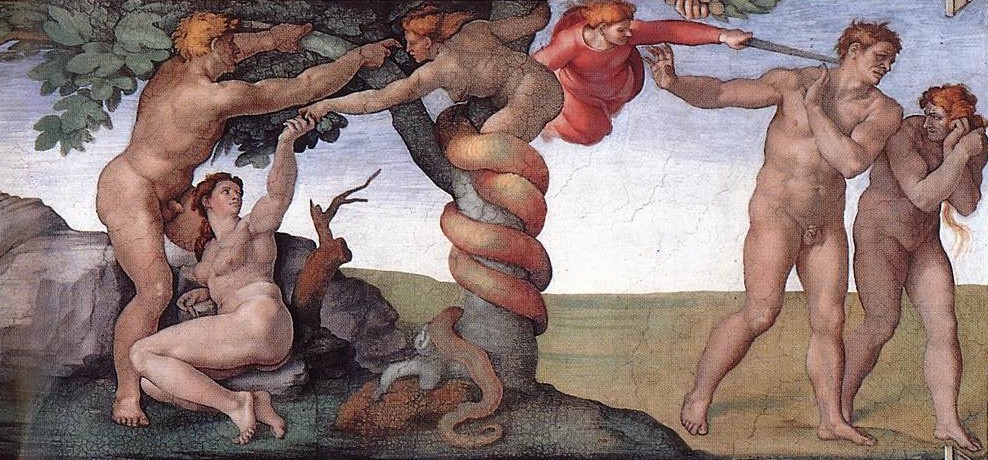– OR –
Why this Atheist Loves the Christmas Eve Message from Apollo 8
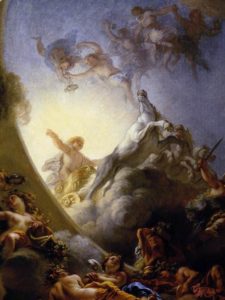
We know of many religions which have ceased to be active… like extinct volcanoes. The Greek myths of today were originally the Greek religion and had temples and priests and inquisitions no doubt… The world is full of dead religions, and to my mind what happens when people stop believing in them literally is that you can then believe in them in a more beautiful way, as story…
Many of the ancient traditions suggest that there’s a moment when human beings outgrow the gods… I see that as being related, in a human life, to the process of growing up. When you’re young, even when you’re an adolescent, you need parents… But there’s a point at which you move from that to being able to make your own life decisions… I see that religious experience as being part of the childhood and adolescence of the human race. And when we grow up, hopefully, we grow out of it.
In the first installment of this essay, I recounted the joys of growing up during the golden age of human space flight. That age, and my childhood, ended with Apollo.
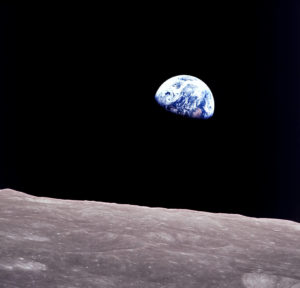
For most of us who remember that time, Apollo 8 left two indelible memories. One was Bill Anders’s iconic image of Earthrise from lunar orbit. The other was the reading to the people of Earth, on Christmas Eve, of verses 1 through 10 of the first chapter of Genesis. Both still evoke goosebumps and tears when I relive them in documentary films.
But how could an atheist love the reading of Genesis in this context? NASA is a government agency, and the astronauts were government employees on the job, representing America if not all of humanity. Wasn’t this a violation of the establishment clause of the First Amendment? A lawsuit was filed at the time to make that point, and many atheists still feel that way about it. They argue that the text was sacred to one religious tradition, and reading it in that moment of global fascination spoiled what should have been a unifying celebration of human achievement. I understand their feelings, but I think they can’t see the forest for the trees.
Consider astronaut Bill Anders’s recent reflections on the Christmas Eve message:
[T]he creation myth or creation story is pretty fundamental… I can’t speak for the other guys, but to me it was not a religious thing so much as a kind of hard hit to the psychological solar plexus that would help mark to humankind the gravity… of man’s first departure from his home planet.
Anders went on to say that space flight had convinced him that our Earth was neither the center of the universe nor the focus of divine attention. Evidently he appreciated that most of us are so immersed in the routine of daily life that we seldom if ever contemplate the deep mysteries of human existence: What are we? What is this strange universe in which we find ourselves? Where did it come from? How can we comprehend it? Reading the myth of creation, while showing our tiny planet in the vastness of space, is one way to jar the sleepwalkers of Earth into awareness.
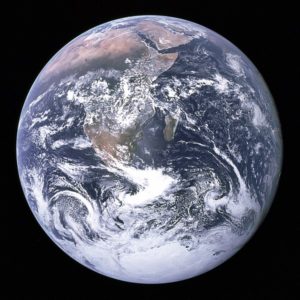
But is there another way, one that would have had the same revelatory effect without the sectarian reference? Yes, of course. In 1931, David Lasser, a visionary engineer, rocket enthusiast, and author, offered this alternative in the voice of a fictional astronaut viewing the whole Earth against the blackness of space:
We are silent before this spectacle. We are suspended motionless in an eternity of space and time. The silence of the dark spaces is so overpowering that we dare not move…
A great spiritual tranquility fills us — a humbleness and a yearning for the continuance of this immense peace. Our being seems spread through the eternity that we can see. We realize now the full meaning of Einstein’s “cosmic religion.” Cities, empires, states; dreams and ambitions; conflict and confusion are infinitely remote, part of the dream-world of that slowly turning globe.
An equally hard hit to the psychological solar plexus, yet somehow lacking. What’s missing, I suggest, is the special power of myth that the astronauts of Apollo 8 exploited to superb effect. Genesis is not merely a myth of cosmogony. It is a myth of growing up, in the sense described above by Salman Rushdie. I made the same point in chapter 10 of my book, The Illusion of God’s Presence:
From scientific cosmology I understand that our universe began about 13.7 billion years ago, but the universe as I personally experience it had a much more recent origin — sometime in the mid 1950s. Although I have good documentation for the exact date, my memory cannot specify it, not even to the right year, because it is lost in the haze of my infantile amnesia. If I could remember it, however, I would probably recognize the following as a fairly accurate description of the experience:
In the beginning, God created the heaven and the earth. And the earth was without form and void; and darkness was upon the face of the deep. And the Spirit of God moved upon the face of the waters. And God said, Let there be light: and there was light.
Each of us has two creators, one of whom does most of the work of creation — especially in that moment when the primordial waters move and light first appears. Substitute “mother” for “God” in the above passage from Genesis, and it seems plausible that these verses allude to the creation of a personal universe, not a cosmological one. Or they may refer to both, much as an image in a dream can have multiple referents. The rest of the first chapter of Genesis suggests the cosmological interpretation, but chapters 2 and 3 are more consistent with the infantile and personal one. Just as a newborn is protected and nourished by its mother, so were Adam and Eve in their paradise of divine origin. In Genesis chapter 3, however, it becomes clear that the metaphor refers not only to early infancy — the period of greatest relevance to my hypothesis — but also to the whole of childhood and adolescence. Central to the story is the transition from prepubertal innocence to adult sexuality, and with it the loss of parental nurture, the need to work for subsistence, and the realization that life is short, difficult, and inevitably ends in death.

By the time of Apollo 8, my childlike faith in the strange God(s) of Christianity had already crumbled to dust. As I explained in part one, a conflict between religious and scientific thinking had long been building in my mind. I was not yet calling myself an atheist, but I could no longer pretend to be a Christian. In April of 1969, as the crew of Apollo 10 trained for their launch in May, I steeled myself for a painful confrontation with my father. As a clueless fifteen-year-old, I did not handle it well. From the perspective of four decades later, in the final chapter of my book, I offered these reflections:
If I had it to do over again, knowing what I know now, I would do it differently. I would begin by thanking my father for caring enough about me to take me to church with him every Sunday, which I am sure he sincerely felt was in my best interest. I would tell him that I had admired and looked up to him all my life. I would thank him for setting a good example for me, through his hard work, honesty, integrity, and dedication to his family. I would tell him that I loved him and always would.
I would say that I no longer believed that God exists. I would explain that belief is not something you can turn on or off at will. Astronauts who have seen the Earth from space can never believe that the Earth is flat. At most they could only pretend to believe it. I would tell him that, when I sit in Sunday school and church, I am only pretending to believe, which I consider an act of dishonesty and hypocrisy. I would remind him that he had raised his son to be honest.
I would tell him that I could no longer go to church with him. I now had to think for myself on this matter. I would emphasize that my rejection of Christianity was not a rejection of him, that I still loved him, and that I still wanted to spend time with him. I would say, “Dad, I don’t believe in God, but I still believe in you.”
If he insisted that I was too young to make this decision, or suggested he would force me to go to church, I would ask him if he really thought that forcing me to go to church would make me more receptive to Christian teaching. I would ask him why he cared so much about my church attendance. Was it for my benefit or his? I would tell him that children must grow up and become adults who think and act independently. Although I was not yet an adult, I was no longer a child. I had begun the transition. No matter how much he and I enjoyed my being a child, that phase was coming to an end, and we both had to accept it.
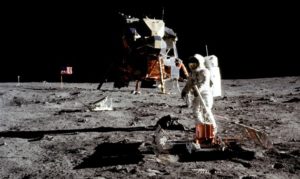
The reference to astronauts reveals the deep connection in my memory of this familial conflict and the glorious achievements of Apollo. Three months after this great rift opened up between me and my parents, Neil Armstrong and Buzz Aldrin walked on the moon. It was a time of pain and joy, of estrangement from the familiar and connection to the new. Science could not fill the emotional void of my adolescence, but it would be the bedrock of my grip on reality for the rest of my life.
Although many prayers were offered for the Apollo astronauts — some by the astronauts themselves — it was science, not prayer, that took them to the moon and back. The mythical god Apollo was a projection of our humanness onto nature, but Apollo 11 was a human creation that rose from a solid foundation of mathematics, chemistry, and physics. Whether we admitted it or not, Project Apollo proved that we were no longer weak and helpless children of the gods. Humanity had begun its transition to adulthood. What better way to acknowledge this than to read from the myth of Genesis?
